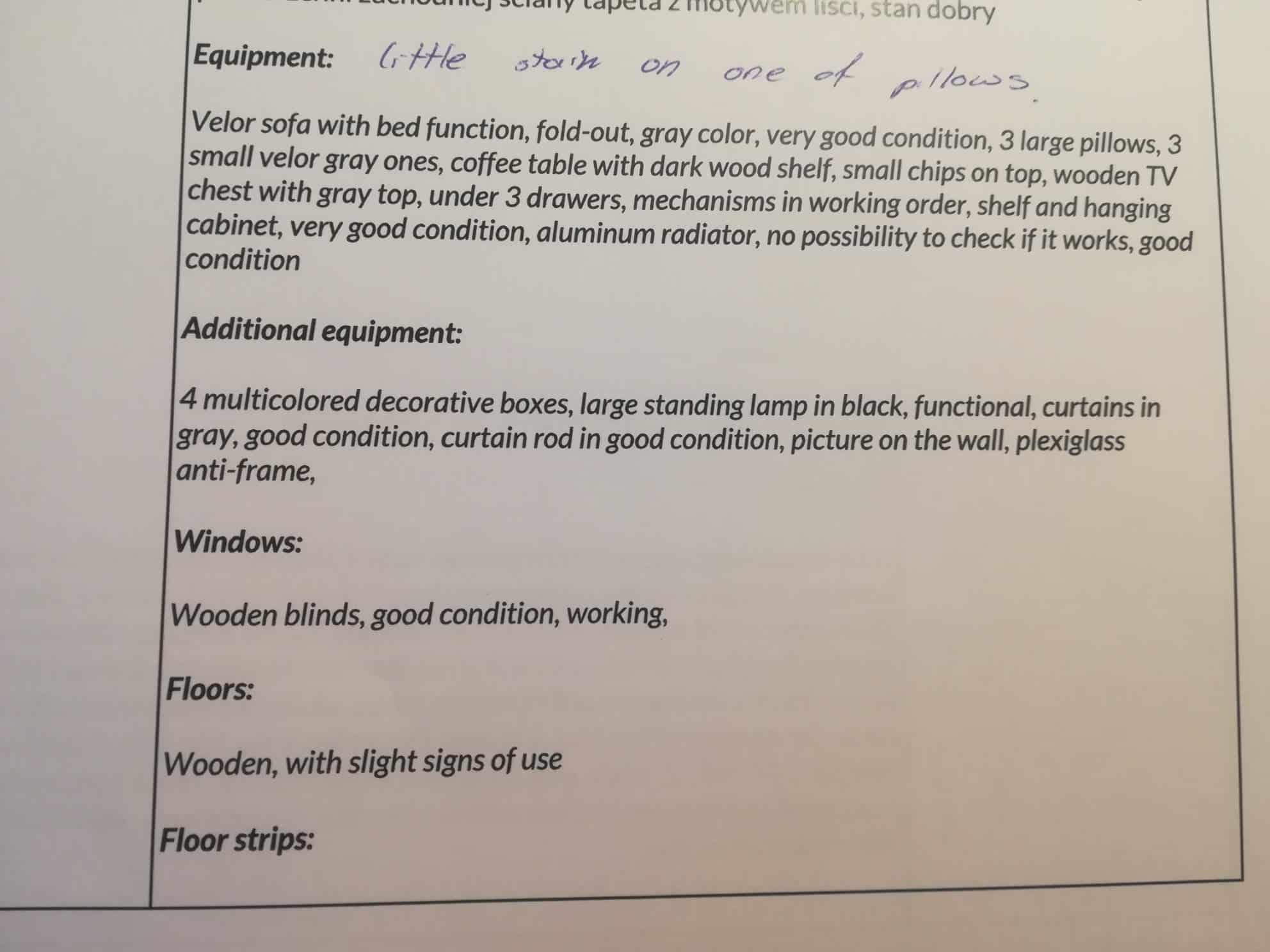Following on from my post on buy to let in Poland back in November 2020, I’d now like to consider the issue of renting an apartment in Poland from the tenant’s perspective.
Adam Wiśniewski, real estate sales and rental specialist for property agency homfi, joined Finding Poland to speak about the situation on the Polish rental market and what tenants need to be aware of when it comes to signing a lease contract.
How to find an apartment to rent in Poland?
There are a few popular online property portals in Poland which people tend to use to search for an apartment.
The most popular portal is Otodom.
Even if you don’t know Polish, it’s a rather self-intuitive matter to navigate your way through the search function:

So, I’ve just run a search for flats to rent in Gdańsk (August 2025).
714 results.
When I originally wrote this article in the summer of 2022, only 179 results appeared.
Clearly, the flow of Ukrainian people into Poland has taken its toll on the housing market. Considering that many of the adverts repeat themselves among various agencies, that 179 was a very low number.
Anyway, here are the translations of some key property-related words and phrases:
- Cena – price
- Powierzchnia – size
- Liczba pokoi – number of rooms
- Więcej filtrów – more search option filters. Here you can check, for example, the date from which an apartment is available, whether there’s a parking space and the year of construction of a building. You can also filter furnished and unfurnished apartments
Other sites for finding real estate in Poland include:
Renting an apartment in Poland – How much does it cost?
Before I give you an inkling of how much it might cost to rent an apartment in Poland, here’s Adam Wiśniewski with a candid summary of the situation as it stood in Gdańsk in mid-April, 2022:
❝ Apartments are rented out very quickly, like fresh rolls in a bakery. We try to serve all customers, but we are unable to control the supply, which is small. The war in Ukraine broke out suddenly – no one was ready for it. The only thing we can control today is that our clients from the east are well served and introduced to apartments with good living standards.
Another scary thing is artificially high prices – owners of apartments wanting to take advantage of the situation seek an increase in rent. On the one hand, it is terrible for immigrants and for us Poles. However, from the point of view of investment, inflation and loans which owners have to contend with, it’s understandable.
Let’s move away from Gdańsk to check out the situation in Warsaw. On Otodom, at least, there are significantly more apartments available to rent in the capital than in Gdańsk:

For apartments with an area of between 35 m2 and 45 m2, there are currently 1,324 offers. The most expensive rent for a 35-45 m2 apartment is 7,600 zl while there are over a dozen apartments of this size which demand a rental fee of over 6,500 zł. Granted, these are insanely expensive exceptions to the rule.
Moving down the list, expect to fork out around 3,200-4500 zł for a cosy well-maintained 35-45 m2 apartment in Warsaw. Rental fees of 2,500zl and below are generally for poorly-kept apartments in older buildings a long way out from the city centre.
For a 70-80 m2 apartment in and around the centre of Warsaw, you should expect to pay upwards of 5,000 zł.
What kind of residential lease agreements exist in Poland?
Polish landlords tend to use two main types of residential lease contracts. Let me briefly go over these two types of contract:
1. Regular residential lease contract
Landlords typically rent out properties under a standard residential lease contract (Umowa najmu lokalu mieszkalnego). With provisions that are set by the Civil Code, this is a standard civil contract.
The landlord is obliged to hand over the premises to the tenant in a condition that is fit for habitation. Moreover, the landlord should keep the property in a suitable condition at his own expense for the entire duration of the contract. However, the tenant must take into account the so-called minor expenses that might be incurred during the term of the contract. These outlays include minor repairs to doors, floors and windows. We can also add painting walls to this list, as well as minor repairs to installations and technical devices which ensure the use of lights, heating the premises, inflow and water outflow.
Pay heed to the description of “minor”. It is worth stating in the contract how both parties understand minor expenditures – what the tenant should do, what the landlord should do, and what can be done together. Or you can organise the repairs yourself, but ask for a refund.
Are tenants strongly protected by Polish law?
Regarding the question of whether Polish law strongly protects the rights of tenants, Mr Wiśniewski had the following to say:
❝ If the tenant is in arrears with the rent, the landlord may terminate the lease (keeping the statutory deadlines), but such “handing over” may not happen if (hypothetically) we are dealing with a fraudster. If the tenant does not return the premises, the owner is forced to go to court, because uniformed officers cannot step in. The whole case may take up to several months (and we must also remember about the period between November-March, when eviction cannot take place). All of this proves that the lessee may live in a premises long after the date on which the premises should have been returned. In this situation, the law puts the owner in a very disadvantageous position.
Obviously, I don’t advocate anyone to take the fraudster route. However, as a tenant, you can be rest assured that Polish law is on your side.
2. Occasional rental agreement
A reasonable proportion of my article on buy to let revolved around another form of contract called the occasional lease agreement (Umowa najmu okazjonalnego).
Essentially, an occasional lease contract offers increased protection to the landlord. Namely, the owner can initiate the eviction process much sooner if, for example, a tenant does not pay rent.
When renting an apartment in Poland, you shouldn’t run for your life if a landlord tries to get you to sign an occasional lease contract. After all, as Mr Wiśniewski pointed out:
❝ It may turn out to be a real blessing if the tenant agrees to the owner’s preference to sign an occasional lease agreement. The tenant is in a better position to negotiate the rental fee and other terms and conditions.
What else should you pay attention to when renting an apartment in Poland?
When renting an apartment in Poland, you should pay heed to the following:
1. Protocol of delivery and acceptance (Protokół zdawczo-odbiorczy)
It is not obligatory to prepare and sign a protocol of delivery and acceptance, but it is worth doing. Such a document protects both parties involved in the lease. The protocol indicates the condition of the premises – what devices are in the apartment, what are its special features etc. This protects the tenant against any potential allegations the landlord might make concerning “damage” or “missing” equipment. Of course, the protocol also provides assurance to the landlord. If any equipment has been damaged, the landlord can demand that the tenant repairs the damage or finances the repairs.
On the day of preparing the protocol, the condition of each item should be described in writing and be accompanied by photographic evidence, which is attached to the protocol.

The protocol should also include the meter readings on the day the property is handed over. Each party will be responsible only for their own energy, gas and electricity consumption.
Finally, the tenant should read the protocol attached to the rental agreement in detail. Have all the necessary sets of keys been released? Have you received a remote control key fob to the shared underground garage?
2. The rental fee and communal fees
When browsing rental ads, you may come across the terms czynsz najmu and czynsz administracyjny.
The difference between the two terms goes as follows:
- Czynsz najmu – a fee for renting a flat or other property, payable on specific dates
- Czynsz administracyjny – the sum of fees to be paid by apartment owners to the accounts of housing associations or members of housing co-operatives for their benefit. The fees cover all the utilities, i.e. those that are influenced by the tenants themselves, and which must be paid monthly in the amount corresponding to the level of consumption. Hence, communal fees mainly concern central heating (if it is municipal or from a local boiler room), electricity used in common areas, waste disposal, and also the cost of water and sewage disposal
A stress free way to rent an apartment in Poland
Reputable estate agencies, such as homfi, exist for a reason – so tenants and property owners don’t incur any unpleasantness and unnecessary consequences.
As Mr Wiśniewski pointed out during our interview:
❝ The most important element of the entire transaction is confirmation of the ownership of the premises. As tenants, we should not sign any contract if we have any doubts. The land and mortgage register number or notarial deed are the two most effective processes for confirming ownership.
If we conclude a lease agreement with the correct person (and the lease agreement itself must also be well prepared), we should not be afraid of anything. The Civil Code itself protects us in the event of incorrect provisions in the contract.
As a real estate agent representing one of the largest offices in Poland (awarded with the Otodom portal statuette) – we always make every effort to verify the property / fees / area, etc. before signing any documents – this allows you to avoid unpleasantness and unnecessary consequences.
Overall, renting an apartment in Poland doesn’t have to be stressful. Trust in a reputable estate agent to carry out the vetting of a landlord and their property for you.

